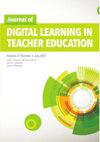The State of the JDLTE: Looking Good!
Q1 Social Sciences
Journal of Digital Learning in Teacher Education
Pub Date : 2019-09-05
DOI:10.1080/21532974.2019.1648955
引用次数: 0
Abstract
As the Journal of Digital Learning in Teacher Education (JDLTE) finishes its 35th year of publication, it seems appropriate to provide our readers with a brief update on the state of the journal. We are pleased to report steady growth in most areas and somewhat dramatic growth in a few places. We have had a production challenge early this year, but that is now history for us. Our association with Taylor & Francis has provided access to extensive data on our work and we are happy to share some of these data in this column. Overall, we are seeing a steady growth in our number of submissions and a dramatic growth in our number of downloads. The dramatic increase in the number of downloads suggests that research published in JDLTE is reaching an expanding audience. Figures 1 and 2 summarize these results. Note that the submission data for 2019 are only for the first half of the year. We are now able to select a few of our articles for open access and we have begun this process by making the 2019 JDLTE research award paper,Where Are We Now? Technology Integration in Teacher Preparation by Ray Buss, Teresa Foulger, LeeAnn Lindsey, and Keith Wetzel available for all. Open access is the free, immediate, online availability of research articles and includes the ability to use these articles. JDLTE will work closely with our publisher to use this tool more in the future to provide our readers with easy access to selected publications. We will be sure to let both authors and readers know which of our articles are available through open access and how they can be accessed. In sum, open access is a valuable tool that will ensure a wider audience for research published in JDLTE. As part of our summary of the state of the JDLTE, we also acknowledge a problem in the JDLTE production schedule earlier this year. Due to some challenges with typesetters, Taylor & Francis delayed publication of JDLTE in the early part of 2019. By May 2019, however, we were back on schedule and we foresee no similar problems in the future. For 35 years the JDLTE has maintained its focus on research and practice in technology in teacher education and its connection to ISTE TEN. The JDLTE has a strong history of committed, thorough, and professional reviewers, and we would like to take this opportunity to recognize the commitment of these reviewers. Please take a look at our editorial review board listed on the first page of this issue; you will note our reviewers are well-known leaders and authors in the field of technology in teacher education. JDLTE reviewers have established a reputation for providing detailed and informed reviews that are useful to our authors, and we are extremely fortunate to have these capable and committed individuals working with us. Special issues focused on current issues in technology in teacher education have become a regular feature for JDLTE in recent years. In January 2018 we published a special issue on Makerspaces in Teacher Education, and in January 2020 we will publish an issue focused on Computational Thinking and Coding for Learning in Teacher Education. We plan to publish a special issue every 2 years and welcome suggestions from readers on possible topics. As we enter our 36th year of publication, we honor the early years (1988–1998) when the journal was titled the Journal of Computers in Teacher Education and celebrate the tradition of contributing to knowledge for technology in teacher education researchers and practitioners. We are proud of the contributions to the advancement of knowledge in the field of technology in teacher education for the past 35 years and look forward to the continuing contributions of JDLTE authors, 2019 ISTE j iste.org/jdlteJDLTE的现状:看起来不错!
随着《教师教育数字学习杂志》(JDLTE)出版35周年,向读者简要介绍该杂志的最新情况似乎是合适的。我们很高兴地报告,大多数地区的经济稳步增长,少数地区的经济略有急剧增长。今年年初,我们遇到了生产挑战,但这对我们来说已经成为历史。我们与Taylor&Francis的合作为我们的工作提供了大量数据,我们很高兴在本专栏中分享其中的一些数据。总的来说,我们看到我们的提交数量稳步增长,下载数量急剧增长。下载量的急剧增加表明,发表在JDLTE上的研究正在扩大受众。图1和图2总结了这些结果。请注意,2019年的提交数据仅适用于上半年。我们现在可以选择一些开放访问的文章,我们已经开始了这一过程,制作了2019年JDLTE研究奖论文《我们现在在哪里?Ray Buss、Teresa Foulger、LeeAnn Lindsey和Keith Wetzel的《教师准备中的技术整合》可供所有人阅读。开放获取是研究文章的免费、即时、在线可用性,包括使用这些文章的能力。JDLTE将与我们的出版商密切合作,在未来更多地使用此工具,为我们的读者提供访问选定出版物的便利。我们一定会让作者和读者知道我们的哪些文章可以通过开放访问获得,以及如何访问。总之,开放访问是一个有价值的工具,它将确保JDLTE中发表的研究有更广泛的受众。作为我们对JDLTE状态总结的一部分,我们还承认今年早些时候JDLTE生产进度存在问题。由于排版师面临一些挑战,Taylor&Francis于2019年初推迟了JDLTE的出版。然而,到2019年5月,我们又回到了计划中,我们预计未来不会出现类似的问题。35年来,JDLTE一直专注于教师教育技术的研究和实践,并与ISTE TEN保持联系。JDLTE有着坚定、彻底和专业的评审员的悠久历史,我们希望借此机会认可这些评审员的承诺。请看一下本期首页列出的我们的编辑评审委员会;你会注意到,我们的评审员是教师教育技术领域的知名领导者和作者。JDLTE评审员以提供对我们的作者有用的详细和知情的评审而闻名,我们非常幸运有这些有能力和有献身精神的人与我们合作。近年来,专注于教师教育中当前技术问题的特殊问题已成为JDLTE的常规功能。2018年1月,我们出版了一期关于教师教育中的创客空间的特刊,2020年1月我们将出版一期关于计算思维和教师教育中学习编码的特刊。我们计划每两年出版一期特刊,欢迎读者就可能的主题提出建议。在我们出版第36个年头之际,我们纪念该杂志最初几年(1988年至1998年)被命名为《教师教育中的计算机杂志》,并庆祝教师教育研究人员和从业者为技术知识做出贡献的传统。我们为过去35年来在教师教育技术领域对知识进步的贡献感到骄傲,并期待JDLTE作者的持续贡献,2019 ISTE j ISTE.org/JDLTE
本文章由计算机程序翻译,如有差异,请以英文原文为准。
求助全文
约1分钟内获得全文
求助全文
来源期刊

Journal of Digital Learning in Teacher Education
Social Sciences-Education
CiteScore
4.90
自引率
0.00%
发文量
15
 求助内容:
求助内容: 应助结果提醒方式:
应助结果提醒方式:


